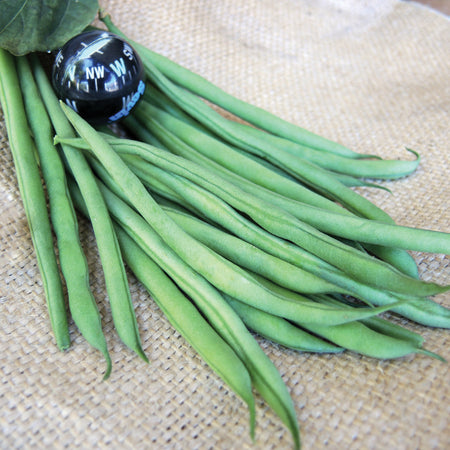COMPASS
Product Description:
| Soil Temp for Germ | 60–85°F |
| Seed Depth | 1" |
| Seed Spacing | 2–4" |
| Days to Emergence | 8–16 |
| Thin Plants to | 4" |
| Row Spacing | 18–36" |
| Fertilizer Needs | Low |
| Minimum Germination | 80% |
| Seeds per Ounce | Listed per variety |
| Seed Life | 2–3 years |
Rich and flavorful beans are fiber-packed veggies that promote digestive health and are excellent sources of antioxidants that scavenge free radicals in the body. They are also nitrogen-fixing legumes; beans gather nitrogen from the air and load it into the soil to feed future crops.
Days to maturity are calculated from date of direct seeding.
Culture
• Beans are shallow rooted and can require up to 1/4 inch of water a day during hot weather
• Optimum soil pH is 5.5-6.5, mildly acidic
• Apply 1 cup of TSC's Complete fertilizer per 10 row feet, and 1 inch of compost
Direct Sowing
• One ounce of seed plants 12-15 row feet, 1/2 pound for 100 row feet
• Grow Pole, Runner, and Yard Long beans on trellises
Insects & Diseases
• Common insects: Mexican bean beetles, bean weevils, cucumber beetles, spider mites
• Insect control: Pyrethrin
• Common diseases: See chart below
• Disease prevention: Avoid wetting the foliage, remove plants at the end of the year, 3-4 year crop rotation
Harvest & Storage
• Ready for harvest about 2 weeks after bloom
• Pick when pods are nearly full size and seeds are still small
• Harvest every 3-5 days to increase yields
• Store at 40-45°F and 95% relative humidity
KEY TO BEAN DISEASE RESISTANCE AND TOLERANCE
HR indicates high resistance.
IR indicates intermediate resistance.
A* | Anthracnose
BB | Bacterial Blight
BBS | Bacterial Brown Spot
BLS | Bacterial Leaf Spot
BMV | Bean Mosaic Virus
CTM | Curly Top Beet Mosaic Virus
DM | Downy Mildew
HB | Halo Blight
PM | Powdery Mildew
PMV | Pod Mottle Virus
R | Common Rust
* Numbers indicate specific disease race.


